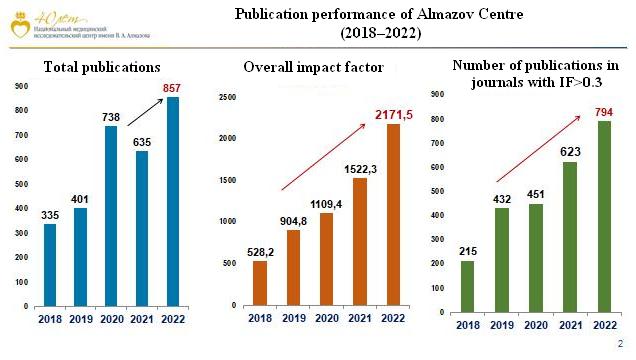Analytical Report of Almazov Centre
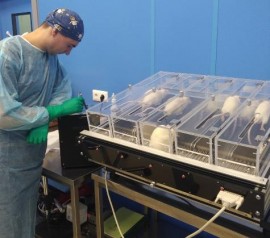
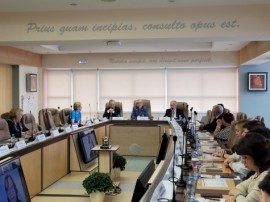
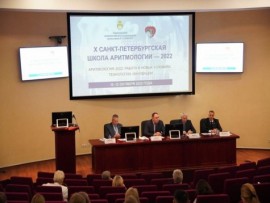
Analytical Report 2022
(based on the results of research state assignment)
Almazov Centre participates in 14 scientific platforms of the Russian Ministry of Health and its specialists are included in the expert groups in six of these platforms. The research teams of the Centre were actively involved in shaping the research topics for these platforms.
The number of scientific staff positions went up from 1078.25 in 2020 to 1210 in 2022. There are 242 scientists involved in research, 197 of whom are under 39 years old (60%).
The scientific structure of Almazov Centre embraces the following research institutes, departments and laboratories:
- World-Class Research Centre for Personalized Medicine
- Institute of Heart and Vessels (16 departments and laboratories)
- Institute of Molecular Biology and Genetics (8 laboratories)
- Institute of Experimental Medicine (12 units)
- Institute of Endocrinology (7 laboratories)
- Institute of Perinatology and Pediatrics (7 laboratories)
- Institute of Oncology and Hematology (7 departments and laboratories)
- Polenov Neurosurgical Institute (branch of Almazov Centre, 12 departments and laboratories)
- Radiology Unit
- Research Department of Microbiology and Nosocomial Infections
- Pathology Unit
- Rheumatology and Immunopathology Research Laboratory
- Department for Clinical Trials and Evidence-Based Medicine
- Core Facilities: Biobank, Preclinical Translational Research Centre
Among the leading scientists, led by Professor Evgeny Shlyakhto, are: two academicians of RAS, 2 corresponding members of RAS, 6 professors of RAS, 156 doctors of sciences and 446 candidates of sciences.
The total Hirsch index of the research staff is 2,894 in RSCI and 1,603 in Scopus.
In 2022, the Centre carried out research work under 46 state assignments, 19 grants, 28 cooperation agreements with Russian partners, 1 international MoU and 100 clinical testing protocols.
Publication activities are increasing every year. In 2022, our scientists published 867 articles in top-tier journals, 216 of them were in Q1-2 journals (25%).
The overall impact factor of the publications made in 2022 was 2,171.5.
Following the state assignment, 730 articles were published in 2022 with a total impact factor of 1687.
Intellectual property
In 2022, the Centre obtained 53 intellectual property results, including 21 patents, 16 database certificates and 16 software certificates. Thirty-two invention applications and one utility model application were filed.
Department of Medical Technology Transfer
On 1 June 2002, the Department of Medical Technology Transfer was established at the Almazov Centre in order to create an effective approach to ensuring and systematically supporting technology transfer processes.
As part of the implemented transfer processes, the Almazov Centre became a co-founder of three small innovative companies under the licence agreements for intellectual property.
In 2022, information and marketing support for the services and projects of the Almazov Centre in the field of medical devices and medicines was provided at specialized exhibitions and events (St. Petersburg Partnership for Small and Medium Business 2022, 5th St. Petersburg Medical Innovation Forum, St. Petersburg International Science and Education Fair), and educational activities were carried out in line with the concept of the Almazov Centre Boiling Point.
In the course of interaction with Technopark of St. Petersburg in the field of innovative development, a number of projects were launched, among others, together with the project management of the Almazov Centre a concept was developed and a pilot event on the creation of a training and exhibition centre for medical innovations was held.
Research under grant projects
In 2022, the Almazov Centre carried out research under 20 grants:
— 3 grants from the Ministry of Science and Higher Education:
— 10 grants from the Russian Science Foundation (RSF)
— 7 grants from the Russian Foundation for Basic Research (RFBR)

The most significant grant project in 2022 was the project to establish and develop a World-Class Research Centre for Personalized Medicine (total funding from the federal budget: more than RUB 2.5 bln).

Total funds raised under grants in 2022: RUB 535 mln.
Additional funds raised in 2022: RUB 135.800 mln (a subsidy for updating the instrumentation of leading Russian institutions).
A total of 134 articles based on the results of research under grant projects were published with a total impact factor of 483.0.
Development of new neuromodulation-based technologies for heart failure prevention and treatment
The project “Development of new neuromodulation-based technologies for heart failure prevention and treatment” was carried out by the Centre’s team under agreement No. 075-15-2020-800 dated 09/24/2020 with the Ministry of Science and Higher Education of the Russian Federation.
A unique 3D mathematical model of ischaemia-reperfusion injury in the human heart was developed, making it possible to predict the effect of humoral factors and changes in the autonomic nervous tone on the development and dynamics of arrhythmias.
It was shown for the first time that subthreshold activation of the vagus nerve using the proposed algorithm during myocardial ischaemia significantly reduces myocardial ischaemic damage and has an antiarrhythmic effect. The original models of pulmonary hypertension showed that the process of pulmonary vascular remodelling, which determines an unfavourable prognosis in the clinic, can be attenuated by eliminating sympathetic effects on the heart and lungs.
For the first time, an approach was developed for highly selective chemical ablation of neurons in the cardiac ganglionated plexus, whose increased activity plays an important role in the development of the most common heart rhythm disorder – atrial fibrillation. The possibility of attenuating atrial fibrillation by local injection of liposome-encapsulated selective neuromodulators into the ganglionated plexus was demonstrated.
For the first time, the effect of non-invasive transcutaneous spinal cord stimulation on arterial hypotension and changes in atrioventricular conduction velocity was demonstrated. A method of spinal cord stimulation was proposed to manage a critical drop in blood pressure in patients with orthostatic hypotension and heart failure. To improve the efficacy and safety of pulmonary artery denervation in patients with decompensated pulmonary hypertension, a method of targeted ablation based on electrophysiological vascular mapping was developed.
The efficacy of using laser energy for minimally invasive fibreoptic destruction of the perivascular nerves of the pulmonary and renal arteries was demonstrated. A technology for the assessment of autonomic regulation in patients with chronic heart failure after heart transplantation was developed, including a quantitative assessment of neurogenic vasomotor regulation using non-contact photooptical plethysmography, which is unmatched in the world.
The molecular mechanisms of heart failure development identified in the course of the project form the basis for the development of new drugs that activate the body's own cardioprotective mechanisms, attenuate the manifestations of fibrosis in the vessels of the pulmonary circulation and influence the pathological neuronal impulses of the autonomic nervous system.
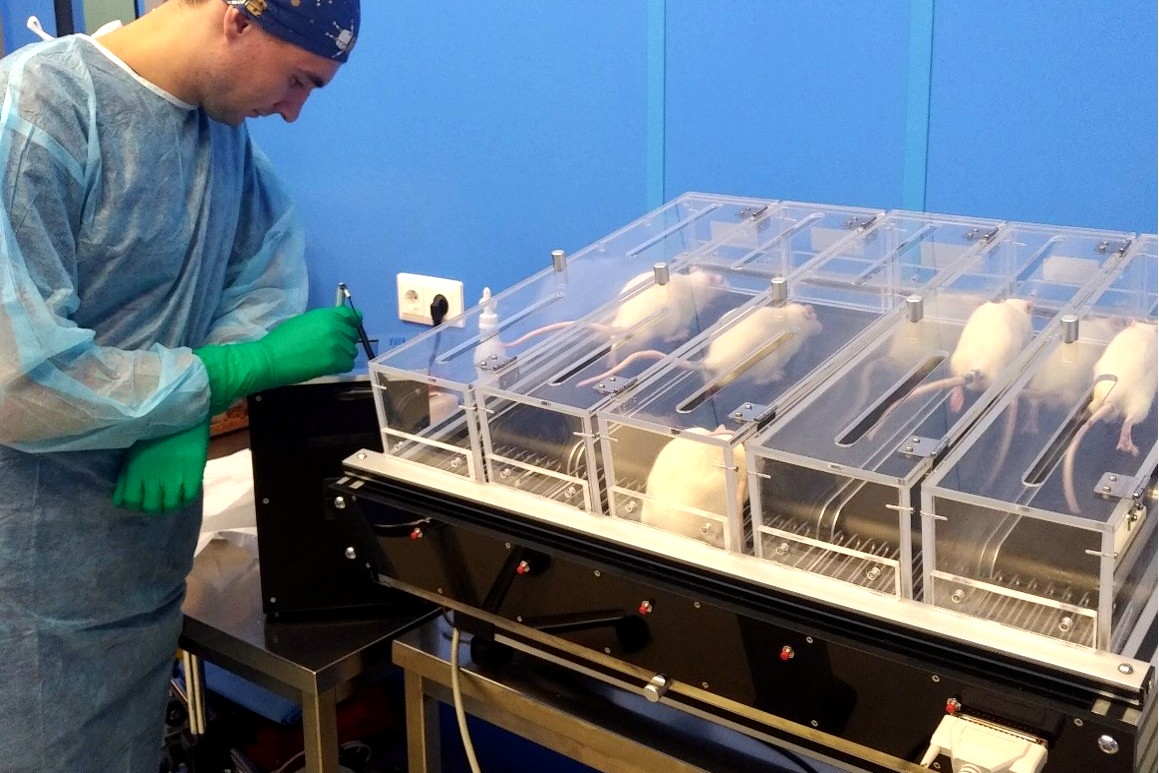
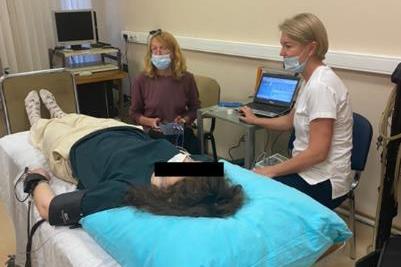
Based on the results of the study, a patent was obtained «Method for protecting the myocardium against ischaemia-reperfusion injury in the experiment» (Polyakova E.A., Minasyan S.M., Mikhailov E.N., Galagudza M.M., Shlyakhto E.V., Patent for invention No. 2776770 RF G09B 23/28, Application No. 2021129002, filed on 10.04.2021).
Clinical results support the use of new drug regimens in patients with heart failure.
The results of the project will contribute to the achievement of the target indicators of the federal project on CVD control.
— Luneva, E.B.; Vasileva, A.A.; Karelkina, E.V.; Boyarinova, M.A.; Mikhaylov, E.N.; Ryzhkov, A.V.; Babenko, A.Y.; Konradi, A.O.; Moiseeva, O.M. Simple Predictors for Cardiac Fibrosis in Patients with Type 2 Diabetes Mellitus: The Role of Circulating Biomarkers and Pulse Wave Velocity. J. Clin. Med. 2022, 11, 2843. https://doi.org/10.3390/jcm11102843 (Q1)
— Khokhlova, A.; Myachina, T.; Butova, X.; Kochurova, A.; Polyakova, E.; Galagudza, M.; Solovyova, O.; Kopylova, G.; Shchepkin, D. The Acute Effects of Leptin on the Contractility of Isolated Rat Atrial and Ventricular Cardiomyocytes. Int. J. Mol. Sci. 2022, 23, 8356. https://doi.org/10.3390/ijms23158356 (Q1)
— Gordeeva, M.; Serdiukova, I.; Krasichkov, A.; Parmon, E. Electrocardiographic Patterns of Depolarization Abnormalities Help to Identify Reduced Left Ventricular Ejection Fraction. Diagnostics 2022, 12, 2020. https://doi.org/10.3390/diagnostics12082020 (Q2)
— Vakhrushev AD, Condori Leandro HI, Goncharova NS, Korobchenko LE, Mitrofanova LB, Makarov IA, Andreeva EM, Lebedev DS, Mikhaylov EN. Laser renal denervation: A comprehensive evaluation of microstructural renal artery lesions. Anat Rec (Hoboken). 2022 Sep 29. doi: 10.1002/ar.25068 (Q2)
World-Class Research Centre for Personalized Medicine
In 2022, the WCRC for Personalized Medicine headed by Academician of the Russian Academy of Sciences Evgeny Shlyakhto continued research aimed at developing and implementing diagnostic and treatment technologies based on personalized medicine, including genetic risk assessment, methods of pharmacogenetics and pharmacogenomics, disease biomodelling, genome modification and the creation of drugs for gene therapy and biomedical cell products with the use of genome editing technologies to improve the quality of treatment and reduce mortality in various cardiovascular diseases, metabolic comorbidities, hematological malignancies and certain types of solid tumors, some infectious diseases, as well as in genetic diseases, including rare and understudied ones.
Specialists presented the results of the WCRC at major scientific congresses in Russia and abroad:
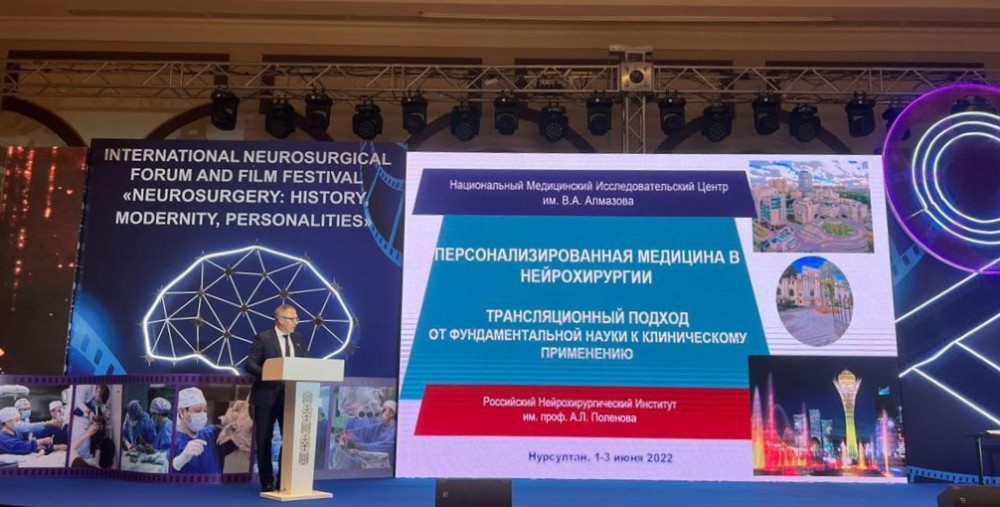
Results from the study of predictors of the development of GDM and predictors of the postprandial glycemic response were presented in posters: «Machine learning-based model for gestational diabetes mellitus prediction in the first trimester of pregnancy» at the European Congress of Endocrinology (DOI: 10.1530/endoabs.81.EP917 ) and «Microbiome and prediction of postprandial blood glucose in patients with gestational diabetes» at the International Conference on Advanced Technologies & Treatments for Diabetes (ATTD 2022, online), DOI: 10.1089/dia.2022.2527.abstract.
The results of the development of a mobile application and the first results of its use were presented in the oral presentation «The use of artificial intelligence in the treatment of GDM: myth or reality?» at the (XXVIII) National Congress of Diabetology with international participation themed «Diabetes mellitus and obesity – non-communicable interdisciplinary pandemics of the XXI century» (Moscow, September 5-8, 2022).
The results on prediction of 5-year mortality and the risk of developing diabetes after myocardial infarction based on machine learning methods were presented in the oral presentation «The role of glucose levels on the first day of myocardial infarction as a predictor of prognosis» at the (XXVIII) National Congress of Diabetology with international participation «Diabetes mellitus and obesity – non-communicable interdisciplinary pandemics of the XXI century» (Moscow, September 5-8, 2022).
At the V Anniversary International Forum of Oncology and Radiotherapy held on 20 September 2022, the specialists of the Research Laboratory took part in the online conference on oncoendocrinology and autoimmune endocrine diseases «For the Sake of Life». In the oral presentation «Management of neuroendocrine tumors in type 1 multiple endocrine neoplasia syndrome from the standpoint of an endocrinologist», they presented their experience in treating patients with type 1 multiple endocrine neoplasia syndrome.
Interim results of the study within the project «Development of a personalized decision support system for determining tactics in patients with malignant neoplasms of various localizations and severe cardiovascular comorbidities» were presented at the international congress «Communities on Thrombosis and Hemostasis» on 12 July 2022 in a poster on the topic: Laboratory assessment of the prothrombotic status in patients with primary brain tumors. (Melnichnikova O, Zhilenkova J, Zolotova E, Sirotkina O, Pishchulov K, Vavilova T, Moiseeva O, Simakova M. https://abstracts.isth.org/ abstract/laboratory-assessment-of-prothrombotic-status-in-patients-with-primary-brain-tumors/ Accessed September 15, 2022).
At the 8th St Petersburg International Oncology Forum White Nights 2022 held from June 27 to July 3 the following presentations were delivered: “Principles of treatment of malignant tumors in pregnancy”, “The timing of targeted immunotherapy”, “Trophoblastic disease in advanced pregnancy”, “Innovations in drug treatment of endometrial cancer”.
WCRC specialists took part in the ESGO Guidelines Committee expert meeting on updating international clinical guidelines for the diagnosis and treatment of vulvar cancer: Part 1: Diagnosis and referral; preoperative investigations; treatment of recurrent disease; Radiotherapy and chemoradiation; pathology; Palliative and supportive care. (online), as well as, in the ESGO Guidelines Committee Expert Meeting on updating international clinical guidelines for the diagnosis and treatment of vulvar cancer: Part 2: Systemic therapy; Surgical management for all stages; Sentinel lymph node; Follow-up (online).

At the international scientific-practical conference on «Topical issues of surgery, transplantology and immunology», dedicated to the memory of Academician of the Academy of Sciences of the Republic of Uzbekistan and the Russian Academy of Medical Sciences Uktam Aripov and the 50th anniversary of the first kidney transplant in Central Asia held in Tashkent on September 14-16, the presentation entitled “Profile of cytokines / chemokines and growth factors in the blood plasma of COVID-19 patients” (Kalinin O. V., Golovkin A. S.) was given.
PRIORITY 2030 PROGRAM OF THE MINISTRY OF SCIENCE AND HIGHER EDUCATION OF THE RUSSIAN FEDERATION
In September 2021, Almazov Centre signed an agreement with LETI University to establish the consortium on “Strong hybrid intelligence technologies for applied medicine” which also includes other leading universities such as Bekhtereva Institute of the Human Brain and Saint Petersburg Chemical and Pharmaceutical University.
The establishment of the consortium enabled the start of cooperation between Almazov Centre and LETI University within the «Territorial and/or Sectoral Leadership» track of the federal program of strategic academic partnership «PRIORITY 2030».
In accordance with the 2022 plan, the research «Development of a system for modelling and analysis of brain function based on the findings of tractography, fMRI and morphometry» was carried out.
A research team led by Professor Gennady Trufanov, Chief Researcher at the Diagnostic Radiology Department, Head of Diagnostic Radiology and Medical Imaging Department at the Institute of Medical Education, has developed new methods of multimodal brain imaging based on the combination of functional MRI, tractography-based and and morphological analysis.
A working prototype of an auxiliary system for statistical analysis of the data set of special MRI techniques (BOLD, DTI, sMRI) has been described. Atrophic changes in the gray matter of the brain in the frontal, parahippocampal and lingual regions, as well as changes in the quantitative indicators of anisotropy in the upper and lower longitudinal fascicles, thalamofrontal tract, uncinate and cingulate fascicles were studied.
Markers have been developed to differentiate parkinsonism from Parkinson's disease (e.g. a decrease in the volume of the subcortical nuclei (thalamus and caudate nuclei), the rostral part of the right middle frontal gyrus, the posterior parts of the cingulate gyrus, and a decrease in the functional and structural connectivity of the tegmental network and the pontocerebellar network and tracts).

SBC map with the medial prefrontal cortex (MPFC) as the ROI, resting-state fMRI (statistical map, T-test)
Using the developed software and hardware system for multimodal brain research based on MRI, markers of atrophic changes in gray matter in the frontal, parahippocampal and lingual areas were determined, as well as changes in the quantitative indicators of anisotropy in the upper and lower longitudinal brain fascicles, thalamofrontal pathway, uncinate and cingulate fascicles, which are the main ones in the pathogenesis of the development of complications of Parkinson's disease: decreased volume of the subcortical nuclei (thalamus and caudate nuclei), the rostral part of the right middle frontal gyrus, the posterior parts of the cingulate gyrus, and decreased functional and structural connectivity of the tegmental network and the pontocerebellar network and tracts.
Clinical testing
Medical care at Almazov Centre can be provided as part of clinical testing of prevention, diagnosis, treatment and rehabilitation methods for various diseases (since 2015).
To date, Almazov Centre has tested 208 protocols, 42 of which were developed by its specialists. More than 4,700 patients from all over Russia received medical care. It should be noted that in 2015 only 28 patients took advantage of this opportunity, in 2022 it was 753 patients.
The main areas for clinical testing in 2022 were: obstetrics and gynecology – 287 patients, cardiovascular surgery – 248 patients, neurosurgery – 70 patients, oncology – 52 patients.
Defended theses
In 2022, a total of 36 theses were successfully defended under the guidance of leading professors and doctors of sciences of Almazov Centre, including 6 doctoral theses and 30 PhD theses.
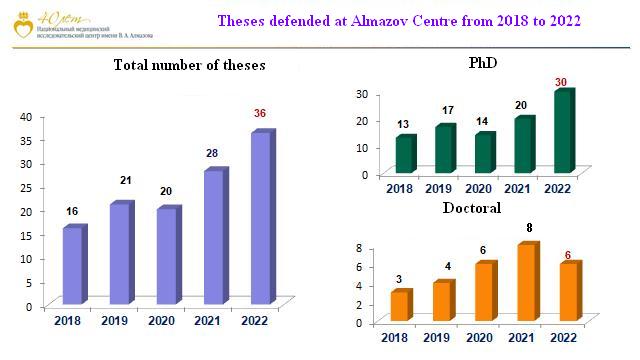
Scientific journals and publications
Almazov Centre is the founder of seven scientific journals and the internal newsletter of Almazov Centre. The journals include Arterial Hypertension, Translational Medicine, Russian Neurosurgical Journal Named After Professor Polenov, Pediatric Neurosurgery and Neurology, Russian Journal for Personalized Medicine, Bulletin of Arrhythmology.
Currently, Arterial Hypertension has an impact factor of 1.8, is listed in the RSCI, Scopus and WOS, the journal is recommended by the Higher Attestation Commission. The journal won the Russian Scientific Journal Award of the Russian Ministry of Education and Science.
Translational Medicine has an impact factor of 0.86, the journal is recommended by the Higher Attestation Commission and is included in the RSCI.
Russian Neurosurgical Journal Named After Professor Polenov has an impact factor of 0.38, is recommended by the Higher Attestation Commission and is included in the RSCI.
In 2022, the new journal was initiated – Russian Journal for Personalized Medicine with 6 issues.
In 2022, the Almazov Centre team published 55 monographs as well as textbooks and teaching guides.
Biobank
The multidisciplinary Biobank is a vital component of the Almazov Centre’s innovative biomedical infrastructure.
The main goal of the Biobank is to comprehensively promote the development of innovative technologies in Russia; to operate at the intersection of biomedical fields, to provide an important link in the development of new breakthrough technologies in various fields of basic and applied biomedicine, and to promote their rapid, high-quality and effective transfer into medical practice.
In its activities, the Biobank adheres to the principles of good laboratory, medical and manufacturing practice. It has a quality management system (QMS) in place that meets the requirements of ISO 9001, and a repository for biological samples that operates in accordance with the international guidelines of ISBER (International Society for Biological and Environmental Repositories).
Today, the Biobank of Almazov Centre has more than 100,000 samples in various collections.
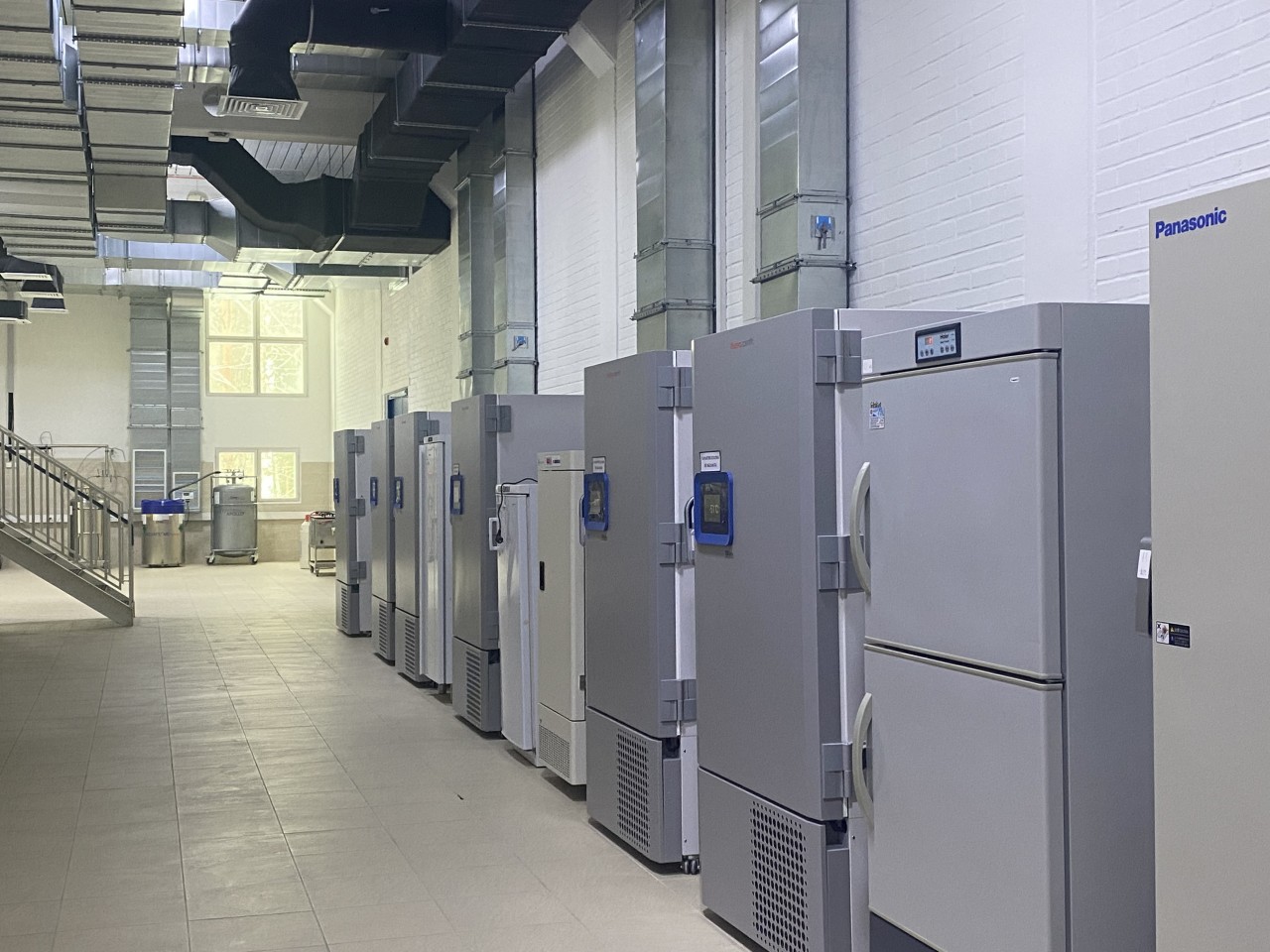
Preclinical Translational Research Centre
The Preclinical Translational Research Centre provides a unique environment for the creation of new high-tech medical and pharmaceutical products and services, accelerating import substitution processes and enhancing the professional skills in the field of biomedicine.
The Centre is equipped and staffed to carry out a full cycle of high-tech basic and applied research in various fields of biomedical science, including the development of new methods for the prevention, diagnosis and treatment of diseases, and the development and validation of various disease experimental models, from in silico to in vivo.
In order to carry out studies on the specific pharmacological activity of drugs, the specialists of the Preclinical Translational Research Centre have at their disposal a large number of validated disease models.
Since 2022, the work of the nursery has been aimed at the breeding and production of laboratory animals for sale to other research organizations. Embryo transfer and transgenesis specialists produce transgenic animals using genome editing methods and cryopreserved gametes.
From 2022, preclinical studies of radiopharmaceuticals have been carried out at the Preclinical Translational Research Centre.
For surgical procedures, the Centre has a 50 m2 large animal operating unit with two operating tables and a full set of anaesthesia, respiratory and resuscitation equipment and the daVinci® Surgical System.
The Preclinical Translational Research Centre is also equipped with state-of-the-art facilities for rearing Danio rerio fish. As the Danio rerio genome contains homologues of 80% of the genes involved in monogenic human genetic diseases, these fish are successfully used in research into human diseases, including blood disorders, tumors, heart, muscle, kidney, central nervous system and eye diseases.


Since 2022, the Preclinical Translational Research Centre has been providing a methodological support service for setting up proteomic and molecular biology experiments based on the Open Laboratory (OPEN LAB). OPEN LAB is a platform equipped with all the necessary scientific equipment and infrastructure to carry out basic and applied research.
International collaboration
Almazov Centre continues to develop international cooperation in the scientific, educational and clinical areas and to expand the geography of foreign partners.
Today, it has more than 50 memoranda of understanding with foreign partners from more than 20 countries. In 2022, 20 new MoUs were signed.
ICD-11
The International Statistical Classification of Diseases and Related Health Problems (ICD) is the cornerstone for identifying health statistics globally. In 2018, WHO published the 11th revision of the ICD (ICD-11), updated for the 21st century and reflecting important advances in science and medical practice. In 2021 and 2022, Almazov Centre was actively involved in one of the stages of the ICD-11 implementation in the Russian Federation – the work to adapt the English version into Russian for acceptance by the Russian medical community. Work on the implementation of ICD-11 will continue in the future.
International events
Specialists of Almazov Centre regularly take part in foreign congresses and conferences; in 2022 experts participated in more than 20 major international events in 16 countries of the world.
Best Research Unit Award
From April 18 to April 29, 2022 Almazov Centre held its annual competition for the Best Research Unit Award approved by order of the Director General.
Based on the final results of the competition, research units were ranked as follows:
1st place – Neurobiology Research Group of the Institute of Experimental Medicine headed by Professor Alan Kaluev (417 points);
2nd place – NCDs Epidemiology Research Laboratory of the Institute of Heart and Vessels headed by Oxana Rotar (252 points);
3rd place — Heart Failure Research Department of the Institute of Heart and Vessels headed by Maria Sitnikova (217 points).


Educational units were ranked as follows:
1st place – Department of Neurology and Psychiatry with Clinic, Medical Faculty of the Institute of Medical Education headed by Tatyana Alekseeva (116 points);
2nd place — Department of Cardiology, Faculty of Higher Qualification Training of the Institute of Medical Education headed by Svetlana Villevalde (105 points);
3rd place – Department of Children's Diseases with Clinic, Medical Faculty of the Institute of Medical Education headed by Professor Irina Nikitina (69 points).


Translational Medicine Cluster
Today, the Translational Medicine Cluster unites 26 participants: research centres, universities, pharmaceutical companies, manufacturers of medical equipment and a development institute.
It aims at creating a market for high-tech sectors of medicine and pharmacy, implementing partnership mechanisms in the field of technological modernization and training, and at forming and developing an innovative healthcare workforce, specialists with modern competencies in the fields of medicine, biology, chemistry, mathematics, enterprise architecture, digital platforms, data management, artificial intelligence through the development of networked educational programs.
Almazov Centre is the core centre of the TM Cluster and its founder, along with five universities in Saint Petersburg:
- Peter the Great Saint-Petersburg Polytechnic University
- Saint Petersburg National Research University of Information Technologies, Mechanics and Optics (ITMO)
- Saint Petersburg Electrotechnical University (LETI)
- Saint Petersburg State Chemical-Pharmaceutical Academy
- Lesgaft National State University of Physical Education, Sport and Health
The «Innovations and Digital Technologies in Healthcare» Management Company is a specialized organization of the Translational Medicine Cluster.
It acts as the project office of the cluster and aims to improve the medical and economic efficiency of medical organizations through the implementation of joint cross-functional projects in the areas of digital, value-based, precision and patient-centered medicine.

